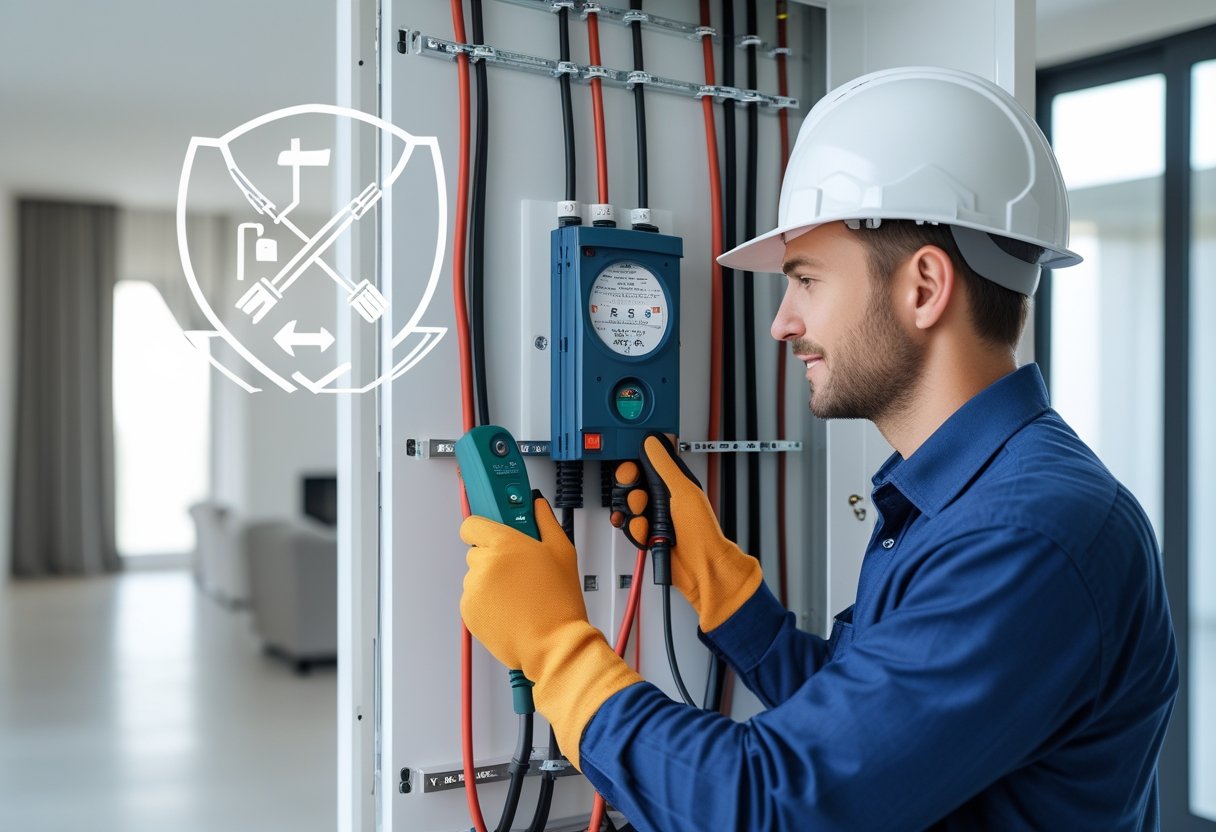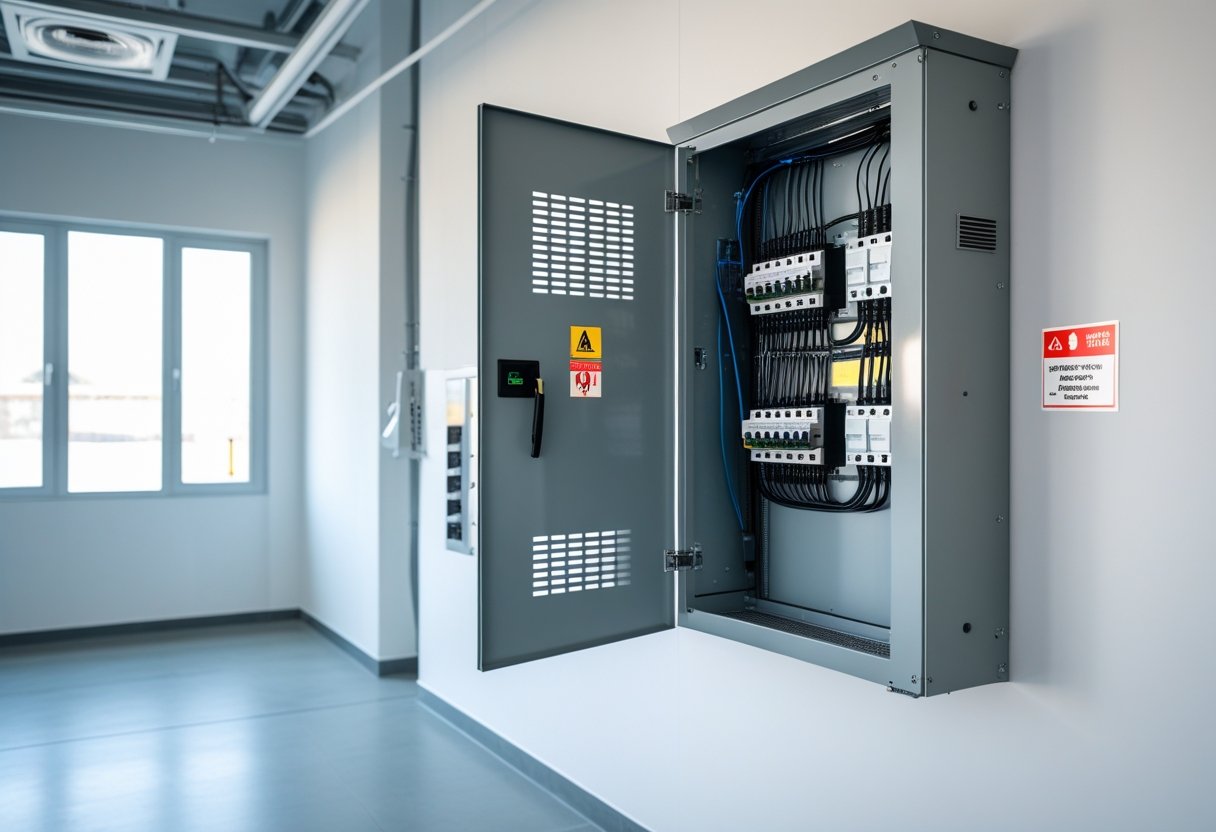If you’re thinking about adding an EV charger station to your business, you’ll want to know what to expect with the installation process.
Installing a commercial EV charging station can cost anywhere from $2,000 to over $40,000, depending on the type of charger and the work needed to upgrade your electrical system. This range helps you plan your investment based on your specific needs.
Electric vehicles are becoming more common. Offering charging at your business can attract customers or support your employees.
The cost depends on several things like how many chargers you want, site work, and power supply upgrades. Knowing these details can save you time and money while making the switch to electric easier.
Choosing the right EV charging setup helps your business stand out and meet the growing demand for clean transportation. Clear information on costs and installation lets you make the best choice for your location and budget.
Benefits of EV Charger Station Installation for Businesses
Installing EV charging stations brings several advantages to your business. You can stand out to new customers, show commitment to the environment, and create new ways to earn money.
Attracting and Retaining Customers
Offering EV charging stations makes your business more appealing to electric vehicle owners. Many EV drivers look for places where they can charge while they shop, eat, or work.
By providing this service, you can draw more visitors to your location. Customers may stay longer while their car charges, which gives them time to explore your store or use other services.
This boosts the chance of more sales and stronger customer loyalty.
Enhancing Sustainability Efforts
Installing EV chargers shows that your business cares about the environment. You help reduce pollution by supporting clean energy use.
This can improve your company’s reputation and attract customers who value green practices. You may also meet sustainability goals or requirements set by local governments or industry groups.
Adding EV stations is a practical step toward lowering your carbon footprint.
Generating Additional Revenue Streams
With EV chargers, you can create new sources of income. Some businesses charge fees for using the stations, which adds to your revenue.
You can also partner with charging networks or apps that share earnings. Offering premium or fast charging options can attract more users willing to pay extra.
This makes the charging stations an investment that supports your bottom line while serving customer needs.
Types of EV Chargers for Commercial Use
When setting up EV charging for your business, you’ll find different types of chargers that vary in speed, cost, and features.
Some chargers work best for quick top-ups, while others are better suited for longer parking times. You also have options that can connect to smart systems to help manage energy use.
Level 2 Charging Stations
Level 2 chargers are a popular choice for businesses because they provide a good balance of speed and cost. They work on 240-volt power and can add about 20 to 30 miles of range per hour of charging.
These chargers are great if your customers or employees park for a few hours. Level 2 stations usually need less costly electrical upgrades compared to faster chargers, so installation can be simpler.
You can install multiple Level 2 chargers to serve several vehicles at once. They are compatible with most electric vehicles today, making them flexible for commercial use.
DC Fast Chargers
DC Fast Chargers deliver power much faster than Level 2, typically adding 60 to 80 miles of range in just 20 minutes. These chargers run on direct current and require higher electrical capacity.
They are ideal for locations where drivers need a quick charge and cannot wait for hours, like highway stops or busy retail areas. Installing DC Fast Chargers often costs more, sometimes tens of thousands of dollars, because of the electrical work and equipment needed.
You may need more space and special permits.
Smart Charging Solutions
Smart chargers use technology to optimize charging times and energy use. They can connect to your building’s energy system or the cloud to reduce electricity costs and balance demand.
With these systems, you can schedule charging during off-peak hours, control access, and monitor usage through apps or software. Smart chargers help you manage many vehicles efficiently.
They often work with Level 2 or DC Fast Chargers to add more control and savings.
Steps for Installing EV Charger Stations
Installing EV charger stations for your business involves careful planning and coordination. You need to check your site, follow local rules, and make sure your electrical system can handle the new equipment.
Site Assessment and Requirements
First, look at the location where you want to install the chargers. Consider how many vehicles will use the chargers and where they will park.
Make sure the area has enough space and is easy to access for drivers. Think about the type of charger you want to install.
Level 2 chargers are common for businesses since they provide faster charging but need more power. Also, check if you need multiple charging ports to handle several cars at once.
Assess your site’s electrical capacity early. This tells you if you need upgrades like new wiring or a bigger electric panel to support the chargers safely.
Permitting and Compliance
Before installation, get the proper permits from your local government. This step ensures your installation meets building codes and safety rules.
You may need to submit plans showing where the chargers will be and how you will connect them to your electrical system. Working with your local utility company can speed up this process.
Check any special requirements like ADA compliance, which means the chargers should be accessible to people with disabilities.
Electrical Infrastructure Preparation
Prepare your electrical system to handle the chargers. This might mean upgrading your electrical panel or running new wiring to the charging sites.
Higher power chargers need thicker wires and more power, which can increase installation costs. Hire a licensed electrician to do this work safely.
If your current electrical setup can't support the chargers, plan for a system upgrade before installation. This helps avoid issues and keeps your chargers running reliably.
Choosing the Right Location on Your Business Property
Picking the best spot for your EV charging station makes a big difference in how often it gets used and how easy it is to maintain. Think about where most people drive or park and make sure the area is safe and easy to get to.
Identifying High-Traffic Areas
Look for places on your property where vehicles stop or park frequently. This could be near the main entrance, close to your office, or by popular loading zones.
Choosing these spots helps make sure your charger gets plenty of use. Check parking patterns throughout the day to find the busiest areas.
If your business has multiple lots, focus on ones with the most visitors. Consider spaces close to electrical panels to lower installation costs.
Use clear signs to direct drivers to the charger. This helps users find the station easily and reduces confusion during busy times.
Ensuring Accessibility and Safety
Make sure your charging station is easy for all types of vehicles to reach, including cars, trucks, and vans. The spot should have enough room for smooth parking without blocking traffic.
Keep the area well-lit and protected from bad weather if possible. Good lighting improves safety at night, while shelters or canopies help protect chargers and users from rain or sun.
Don’t place chargers near corners or blind spots where accidents could happen. Check local rules for any needed permits or setbacks to keep your installation legal and safe.
Consider adding safety features like bollards or barriers to protect the charger from vehicle damage. This lowers maintenance needs and keeps your station working well longer.
Cost Factors and Incentives
Installing an EV charging station for your business involves several costs upfront, but you can also find financial help from government programs. Over time, you save money by using electricity instead of gas.
Upfront Installation Costs
The price to install a commercial EV charging station usually ranges from $5,000 to $40,000. This depends on things like the number of charging ports and the type of charger you choose.
If your building’s electrical system needs an upgrade, such as a new panel, that adds to the cost. Location matters too—installing in a remote area may require more work and expense.
You might pay extra for faster chargers or if you want multiple units. Labor and permit fees also affect the total price.
Government Grants and Rebates
Many states and local governments offer money back to help pay for EV charger installation. These programs include tax credits, rebates, or grants.
To qualify, you usually need to apply before starting the project. Check what incentives are available where your business is located.
Some places cover part of the equipment cost or installation fees. These savings can lower your upfront expenses by thousands of dollars.
Long-Term Operational Savings
Running EV chargers costs less than fueling gas vehicles. Electricity prices tend to be stable, so you avoid the ups and downs of gas prices.
Charging electric vehicles also uses less energy overall, which saves money. Over time, this reduces your business’s transportation costs.
Offering EV charging can attract customers who prefer green options, potentially increasing your revenue.
Selecting a Professional Installation Provider
Choosing the right installer for your business’s EV charging station is important. You want someone who knows the job well and offers clear terms for their work.
This will help ensure a smooth installation and save you time and money.
Evaluating Experience and Credentials
Look for installers with proven experience in commercial EV charger setups. Check if they have handled projects similar in size and complexity to yours.
Ask about their certifications and licenses to make sure they meet local and state requirements. You can also request references or examples of past work.
Experienced professionals understand the specific needs of businesses, like managing power capacity and installing multiple chargers. This knowledge helps avoid delays and extra costs during installation.
Make sure the installer follows all safety codes and permits needed in your area. This protects your investment and ensures your charging station operates without issues.
Understanding Service Agreements
Before hiring, review the service agreement closely. It should clearly state what the price covers, including parts, labor, and permits.
Ask for details about warranties on the charger and installation work. Check if the agreement includes ongoing maintenance or customer support.
Knowing who to contact in case of a problem saves trouble later. Also, confirm the estimated timeline for the installation to fit your business schedule.
If there are any potential extra costs, like upgrades to electrical panels, they should be written upfront. Clear agreements help you avoid surprises and make managing your new EV charging station easier.
Maintenance and Support for EV Charging Stations
Keeping your EV charging station working well means regular upkeep and quickly fixing any problems. You’ll want to know what parts need checking often and how to handle common issues so your customers or employees can charge without trouble.
Regular Maintenance Needs
Inspect your charging station often to keep it safe and reliable. Check cables, connectors, and plugs for wear or damage every month.
Dirt and debris can build up, so clean the charging ports and screens regularly with a dry cloth. Monitor software updates from the manufacturer.
These updates improve performance and fix bugs. Also, verify that the electrical panel and wiring are in good condition.
Testing the unit’s charging speed and making sure all indicator lights work helps catch problems early. A maintenance log is helpful.
Write down any inspections, cleaning, or repairs done. This record makes it easier to spot patterns or repeated issues.
Troubleshooting and Repairs
If your charger stops working or behaves oddly, start by checking the basics. Make sure it’s plugged in and the power source is active.
Look for error messages on the display or app and refer to the manual for what those codes mean. Common problems include loose cables, worn connectors, or software glitches.
You may fix minor issues like cable replacement yourself. For bigger electrical or software problems, call a qualified technician.
Keep contact info for your charger’s support team handy. Some manufacturers offer remote diagnostics, which can save time by identifying issues without needing in-person visits.
Quick response to problems ensures your station stays available for use.
Promoting Your Business’s EV Charging Services
To make the most of your EV charging stations, you need to attract both customers and employees. Getting the word out and connecting with the right partners will help your business stand out and encourage use of your charging spots.
Marketing to Customers and Employees
Show clearly that you offer EV charging. Use signs at your business entrance and parking areas to guide drivers.
Highlight your charging service on your website and social media pages. Include important details like charger type and availability.
You can also offer incentives. Free or discounted charging during certain hours encourages more visits.
Tell your employees about the chargers so they can use them and mention this perk when hiring. Adding charging info to emails or receipts helps remind customers.
Keep communication clear and easy to find to increase awareness and use.
Partnering with EV Networks
Joining an EV charging network connects your stations to apps and maps that EV drivers use every day. Networks help drivers find you and can increase traffic to your location.
Look for networks that match your needs. Some cater to commercial businesses, while others serve local or regional drivers.
Consider fees and features like real-time availability updates. You can also join green energy or local business groups to promote your chargers.
These partnerships make your EV services more visible and trusted by the EV community.
Future-Proofing and Scaling Your EV Charging Infrastructure
To keep your EV charging station ready for the future, think about growing customer needs and clean energy options. Planning ahead helps you avoid costly upgrades later.
Planning for Increased Demand
Start by estimating how many EV drivers will use your chargers over the next 5 to 10 years. Look at local EV sales trends and nearby EV infrastructure to judge growth.
Choose chargers that can handle higher power levels. Fast chargers attract more users and reduce wait times.
Install a power management system to balance energy use across all chargers. Design your setup so you can add more chargers later.
Use modular equipment with space and wiring ready for expansion. This saves time and money as demand grows.
Integrating with Renewable Energy Sources
Using solar panels or wind turbines can cut your electricity costs and reduce your carbon footprint. If you have space on your building or property, installing solar panels is a smart choice.
Pair solar energy with battery storage to store extra power for busy times or when the sun isn’t shining. Make sure your charging system can connect to your renewable power setup smoothly.
You may need smart controllers or energy management software for this connection.
Frequently Asked Questions
Installing EV chargers at your business can help you attract new customers and support clean energy. You’ll want to understand costs, charger types, available incentives, timing, and how to keep the stations easy to use.
What are the benefits of installing EV charging stations at my business location?
You can attract more customers who drive electric vehicles. Offering chargers can also boost your business’s image by showing you support green technology.
Can you help me understand the costs associated with commercial EV charger installation?
Commercial EV charger installation costs usually range from $5,000 to $40,000. The price depends on the number of chargers, the type of charger, site preparation, and any electrical upgrades needed.
How do I determine the best type of EV charger for my business needs?
Consider how quickly you want cars to charge and how many vehicles you expect. Level 2 chargers work well for longer stops, while fast chargers fill batteries quickly but cost more.
Think about your customers’ habits and your budget.
Are there any incentives or tax credits available for businesses that install EV chargers?
Some states and local programs offer rebates or tax credits. Check what incentives are available in your area to help lower your installation costs.
What is the typical timeline for installing an EV charger station at a business?
Installation usually takes a few weeks from planning to finishing. Timing depends on permits, electrical work, and how many chargers you install.
Some projects may take longer if upgrades to the building’s power supply are needed.
How can I ensure that my EV charging stations are accessible and convenient for customers?
Place chargers in well-lit, easy-to-find spots with clear signage. Make sure parking spaces are wide enough and close to your business entrance.
Perform regular maintenance to keep the stations working well. This helps ensure customers stay happy.





